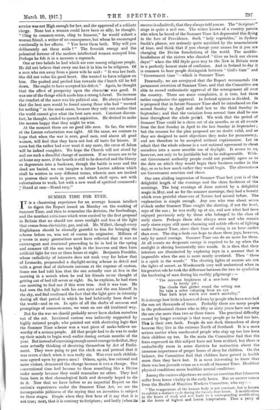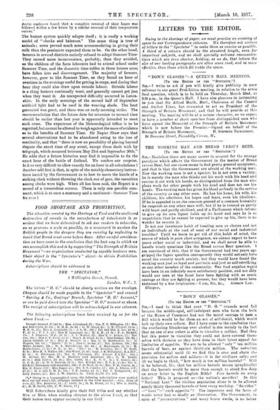STJMIsIER TIME FOR EVER.
IT is a chastening experience for an average human intellect to digest the Report issued on Monday on the working of Summer Time, and then to remember the derision, the forebodings, and the mordant criticisms which were excited by the first proposal in Britain that we should use more sunlight and less of the light that comes from electricity, gas, and oil. Mr. Willett, though every Englishman should be eternally grateful to him for bringing the scheme before us, was not of course its originator. Millions of psrsons in many generations must have reflected that it was an extravagant and irrational proceeding to lie in bed in the spring and .summer till the sun was high in the heavens and then turn artificial light for two or three hours at night. Benjamin Franklin, whose catholicity of interests does not rank very far below that of Leonardo, propounded a daylight-saving scheme in detail and with a great deal of elaborate sarcasm at the expense of custom. Some one had told him that the sun actually rose at five in the morning in a month when he and his friends never thought of getting cut of bed till seven or eight. So, he explains, he had risen one morning to find out if this were true. And it was true. He had seen the full light with his own eyes and the sun himself in the sky, and had confirmed the fact that the light grew in intensity during all that period in which ho had habitually been dead to the world—and so on. In spite of all the shafts of sarcasm and promptings of common-sense, we went on our old irrational way.
But for the war we should probably never have shaken ourselves out of the rut. Irrational custom was indirectly supported by highly rational people, who pointed out with shattering logic that the Summer Time scheme was a vast piece of make-believe un- worthy of a serious people. All that people had to do was to make up their minds to begin work earlier during certain months of the year. But instead of exercising enough moral courage to do that, they were actually thinking of deceiving themselves by Act of Parlia- ment. They were going to put the clock on and pretend that it was seven o'clock when it was really six. Was ever such childish- ness agreed upon by grown men ! Others, again, less rational and more violent, denounced the change because it was a change. Our conventional time had become to them something like a Divine order merely because they could remember no other. They had been born in that chronological faith and devoutly hoped to die in it. Now that we have before us an impartial Report on the nation's experiences under the Summer Timo Act, we see the incomparable pithiness of the saying that an invention is subject to three stages. People when they first hear of it say that it is not true; next, that it is contraryto Scripture; and lastly (when its success is admitted), that they always told you so. The "Scripture " stage is quite a real one. Tho writer knows of a country parson who when he heard of the Summer Time Act deprecated this flying in the face of Providence. Such " holy vegetables," in Sydney Smith's phrase, are seriously quite mystified by the nomenclature of time, and think that if you change your names for it you are changing the Divine foundations of the world. Tho muddle- headedness of the rioters who shouted " Give us back our eleven
days !" when the Old Style gave way to the New in Britain were in a perfectly honest state of confusion. And in Ireland to-day it is common to hear people distinguish between " God's time " and " Government time "—which is Summer Time.
Personally, we are overjoyed that the Report recommends the permanent retention of Summer Time, and that the Committee are able to record enthusiastic approval of the arrangement all over the country. There are some complaints, it is true, but these rather emphasize the approval. In Ireland opinion is divided. It is proposed that in future Summer Time shall be introduced on the second Sunday in April and shall last to the third Sunday in September; and that the variation from normal time shall be one hour throughout the whole period. We wish that the period of Summer Time could be a clean cut of six months, or at all events from the first Sunday in April to the last Sunday in September ; but the reasons for the plan proposed are no doubt valid, and as they are designed to meet objections they make for permanency, and are therefore to be accepted without captiousness. Let us admit that the whole scheme is a vast national agreement to cheab ourselves into a more sensible use of daylight. It seems to us, however, not only to be justifiable but to be indispensable. With- out Government authority people could not possibly agree as to the date on which they would begin their business earlier in the day, or as to how much earlier. they would begin. The alternatives are Government sanction and chaos.
Our own abiding impression of Summer Time last year is of the delightful length of the evenings and the clean freshness of the mornings. The long evenings of Juno arrived by a delightful magic in May, and as for the summer mornings, they had a beauty which even grateful observers of Nature had missed before. The explanation is simple enough. Any one who rose about seven o'clock under Summer Time caught the slanting, if not the level, rays of the sun ; he was really up at six, and saw what had been enjoyed previously only by those who belonged to the class of early risers. Perhaps those who always were and who remain early risers enjoy still more charming and subtle effects of lighting under Summer Time, since their time of rising is an hour earlier than over. The slug-a-beds can hope to share these joys, however, only by moral courage. Summer Time can do no more for them.
At all events no desperate energy is required to be up when the sunlight is shining horizontally into woods. It is then that their interiors are illuminated by exploring rays in a manner that is impossible when the sun is more nearly overhead. Then " there is a spirit in the woods." The slanting lights of sunrise are not the lights of sunset, as Wordsworth very well understood when in his greatest ode he took the difference between the two to symbolize the hardening of man during his earthly pilgrimage :-
" The innocent brightness of a new-born Day Is lovely yet ;
The clouds that gather round the setting sun Do take a sober colouring from an eye That hath kept watch o'er man's mortality."
It is strange how little is known of dawn by people who have watched the sun set thousands of times. Probably there are many people in the professional classes who in fifty or sixty years have not seen the sun rise more than two or three times. The practical difficulty caused by longer evenings is that many people go to bed too late. This is their own fault. People do not dock themselves of sleep because they live in the extreme North of Scotland. It is a more serious matter when uneducated people who stay up too late keep their children up too. In the main the Committee find that the fears expressed on this subject have not been realized, but there is undoubtedly room in some districts for instruction about the immense importance of proper hours of sleep for children. On the balance, the Committee find that children have gained in health more than they have lost. It is most interesting to know that there was less juvenile crime as a result of Summer Time. Healthier physical conditions mean healthier mental conditions.
Among the curious objections we notice an assertion that labourers suffer from lower vitality in the early hours. But an answer comes from the Health of Munition Workers Committee, who say :---
" The temperature of the human body is not constant, but is known to cihibit a distinct cycle during the twenty-four hours. A modification in the hours of work and rest leads to a corresponding modification in the hours of highest and lowest temperature. Thus a party of Arctic explorers found that a complete reversal of their hours was followed within a few hours by a similar reversal of their temperature curves."
The human system quickly adapts itself ; it is really a working model of " checks and balances." The same thing is true of animals ; cows proved much more accommodating in giving their milk than the pessimists expected them to be. On the other hand, farmers in several districts entirely refused to adopt Summer Time- They caused more inconvenience, probably, than they avoided, as the children of the farm labourers had to attend school under Summer Time, and the domestic time-tables in those houses must have fallen into sad disarrangement. The majority of farmers, however, grew to like Summer Time, as they found an hour of overtime in the evenings useful for getting in crops, and during that hour they could also draw upon outside labour. Outside labour is a thing farmers continually want, and generally cannot get just when they want it. An unexpected difficulty occurred in Lanca- shire. In the early mornings of the second half of September artificial light had to be used in the weaving sheds. The heat generated was great, and there was an early-morning strike. The recommendation that the future date for reversion to normal time should be earlier than last year is apparently intended to meet such cases. The experience of the Meteorological Office is to be regretted,but cannot be allowed to weigh against the mass of evidence as to the benefits of Summer Time. Sir Napier Shaw says that several observations had to be abandoned owing to the loss of continuity, and that " there is now no possibility of placing beyond dispute the exact time of any event, except those dealt with by telegraph, which occurred between May 21st and September 30th." He adds that a future historian may find it impossible to fix the exact hour of the battle of Jutland. We confess our surprise. Is it so very difficult to allow exactly for an hour in all calculations ? Another odd fact is that, in spite of the notably elementary instruc- tions issued by the Government as to how to move the hands of a striking clock without throwing the clock out of gear, the casualties among clocks were high. When all has been said, the Report is a record of a tremendous success. There is only one possible com- ment, which is at once a summary and a sentiment-Summer Time for ever I



































 Previous page
Previous page